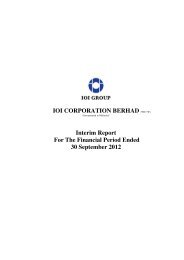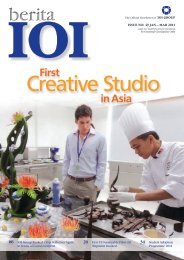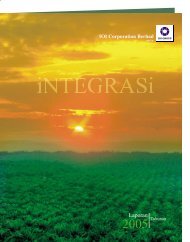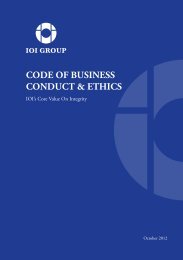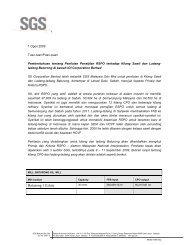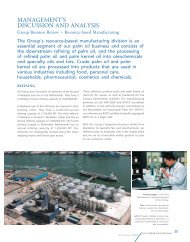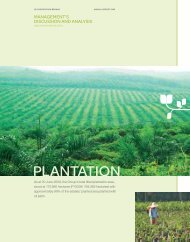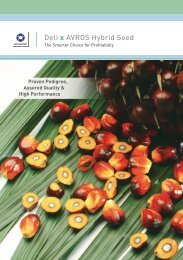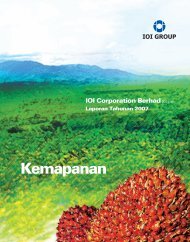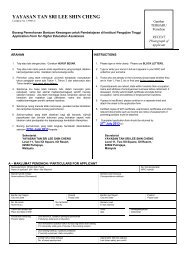Annual Report 2012 - IOI Group
Annual Report 2012 - IOI Group
Annual Report 2012 - IOI Group
You also want an ePaper? Increase the reach of your titles
YUMPU automatically turns print PDFs into web optimized ePapers that Google loves.
Top: Beneficial plants.Bottom: Buffalo breedingfarms in Tindakon Estate,Sandakan, Sabah.<strong>IOI</strong> <strong>Group</strong> practises integrated pest managementwhereby biological control is integrated into pestmanagement practices to reduce dependency onchemicals in day-to-day operations. Beneficial plants(e.g. Cassia cobanensis and Tunera spp.) are plantedto attract natural predators for biological control ofbagworms and other leaf-eating caterpillars which aremajor insect pests in oil palm plantation while theintroduction of barn owls has been effective incontrolling the rat population in estates. LCC areestablished in estates to suppress the growth ofnoxious weeds which may result in crop loss. In linewith its commitment to environmental and socialresponsibility, the <strong>Group</strong> has fully phased out the useof paraquat by end of 2011.Buffaloes are also used wherever practical instead ofmechanical machines to transport fresh fruit bunchesfrom infields. By using as little fossil fuel as possible,the <strong>Group</strong> managed to reduce the amount ofundesirable emissions, greenhouse gases andpollution that are produced from daily operations.Through an efficient and effective plantationmanagement programme, <strong>IOI</strong> <strong>Group</strong>’s palm oil yieldper hectare is 50% greater than the industry averagefor oil palm which has resulted in a dramaticreduction in the land required to produce the sameamount of palm oil by a remarkable 80,000 hectares.This efficient use of land translates into lowerfertilisers, pesticides and energy usage as well aslower greenhouse gas emissions which in turndeliver significant benefits to the environment.InternationalSustainability BenchmarksRSPO CertificationAs a founding member of the RSPO, <strong>IOI</strong> <strong>Group</strong> hasplayed an active role in promoting sustainablepractices since its inception in 2004. It also advocatessustainable agricultural practices in its estates tobring growth and use of certified sustainable palmoil to the world market. All of <strong>IOI</strong> <strong>Group</strong>’s mills andestates in Peninsular Malaysia have successfullyattained the RSPO Certification. In Sabah, four of <strong>IOI</strong><strong>Group</strong>’s mills and their supply bases have beencertified to date. In total, <strong>IOI</strong> <strong>Group</strong> currently has anestimated production of about 477,000 MT ofcertified sustainable palm oil per year.In addition, the entire <strong>IOI</strong> <strong>Group</strong>’s operating unitsand supply chain units have successfully obtainedthe RSPO Supply Chain Certification.ISCC CertificationIn addition to the RSPO Certification, <strong>IOI</strong> <strong>Group</strong> is alsopursuing the International Sustainability and CarbonCertification (“ISCC”), which is the first internationalcertification system that can be used to provesustainability and greenhouse gas savings for all kindsof biomass and bio-energy. It is recognised by theEuropean Commission for all member countries as wellas recognised by Germany and the Netherlands.Currently, seven <strong>IOI</strong>’s palm oil mills and their supplybases in Peninsular Malaysia and Sabah have beenawarded the ISCC certification. The achievementsignifies <strong>IOI</strong> <strong>Group</strong>’s products to be in compliancewith the strict sustainability criteria for the use ofbiomass in renewable energy application set by theEuropean Commission.50<strong>IOI</strong> CORPORATION BERHAD<strong>Annual</strong> <strong>Report</strong> <strong>2012</strong>



